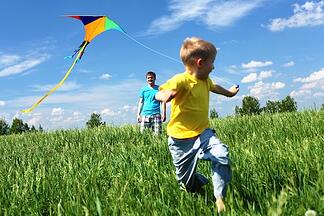The Problem with Parent-Directed Activities
3 min read
Date Published: 07/08/2014
Last Updated: 07/08/2014
National Fatherhood Initiative Blog / Latest Articles
3 min read
As a parent, you want to see your child happy and healthy. Many parents are buying into the idea that happy, healthy kids are created when the parents arrange a plethora of directed activities. They spend their days shuttling kids from soccer games to gymnastics practice to piano lessons, all in the hopes of keeping their minds and bodies happy. Yet despite your best intentions, these activities may be doing more harm than good for your children's development.
The Loss of Free Play
 If you read our blog much, you know we like to provide helpful parenting tips from time to time—both for dads and for those who serve dads. When you were a kid, chances are your parents sent you outside to play for hours. You may have roamed your neighborhood and enjoyed pickup games of baseball or kickball. Do your kids get the chance to do this? If you’re like the average modern family, the answer is no. Free playtime is being lost to adult-directed activities, and this is to the detriment of our children.
If you read our blog much, you know we like to provide helpful parenting tips from time to time—both for dads and for those who serve dads. When you were a kid, chances are your parents sent you outside to play for hours. You may have roamed your neighborhood and enjoyed pickup games of baseball or kickball. Do your kids get the chance to do this? If you’re like the average modern family, the answer is no. Free playtime is being lost to adult-directed activities, and this is to the detriment of our children.
Parents cite many reasons that they don't simply let their kids play. Reasons include:
Increased academic demands
Concerns for safety
Lack of other children to play with
Lack of time in the schedule
Some of these reasons are legitimate. You do, after all, have a responsibility to keep your children safe. Yet, failing to let them play is bringing on a new set of dangers. Before you assume that hovering over your kids and choosing their activities is the best, consider the dangers of constant parent direction in play.
The Loss of Play Increases Anxiety and Depression
From 1981 to 2006, suicide rates for children under the age of 15 years doubled, according to the American Association of Suicidology. Children are facing serious problems with anxiety and depression. Interestingly, in this same time frame the opportunity for children to play on their own has dropped at an alarming rate.
Why is this? During play, children learn how to take risks. They can mitigate the risk and the fear it brings with the happiness the activity brings. If going down the tall, twisty slide is too frightening, no one pushes them to do it. They can choose the shorter slide for the first few trips until they gain the confidence to try the big one.
This type of self-directed play teaches children how to handle and overcome anxiety. It also brings great happiness, which lessens the chances of depression. Children are more emotionally stable when they get the chance to play free of parental direction.
Free Play Benefits Children in Crucial Areas of Development
Emotional and mental health is just one aspect of free play as it benefits children. Parents who let their children play on their own on a regular basis will also notice:
Children learn how to handle emotions
Children learn to make friends and get along with peers
Children develop better imaginations and problem-solving skills
Children learn what they do and do not enjoy
Children become more self-aware and self-confident
Children who are constantly directed in their activities don’t get the chance to explore peer interactions, or activities they enjoy that parents might not think of.
How to Incorporate More Free Play Time
If free play is so important to your child's development, what can you do to incorporate more of it in your family? Here are some practical suggestions:
Cut down on scheduled activities to make time to play
Create a safe outdoor play area where you are comfortable letting your children play
Let your children be bored, even if it requires practice for both you and them
Limit or eliminate television and video games during the week
Meet the neighborhood parents so you feel comfortable letting your kids play together
Take action with other local parents to make the neighborhood safe for free play
Sending your children out to play without you at their side, or stepping back when they’re at the playground is not lazy parenting — it’s good for your kids. Find ways to incorporate safe free play times into your life, and watch your children's emotional, mental and social health blossom.
Do you agree or disagree with my assessment? Why or why not?
David Reeves is the Marketing Director of Grounds For Play, a division of Superior Recreational Products in Carrollton, GA. The company is focused on the design of play structures and environments that challenge children mentally and physically.
image: shutterstock
Date Published: 07/08/2014
Last Updated: 07/08/2014
Download the ebook to learn how to create fatherhood initiatives that engage every sector of community life.

Train Your Staff
Fatherhood Programs
Fatherhood Data
© 2025 National Fatherhood Initiative®. All rights reserved.